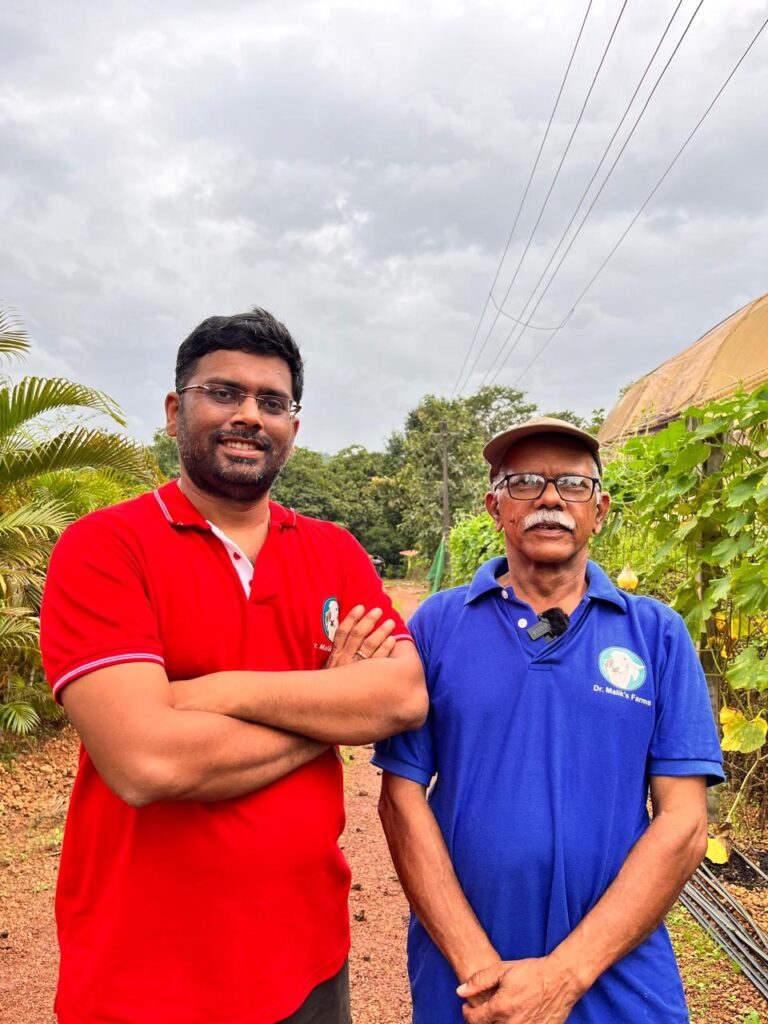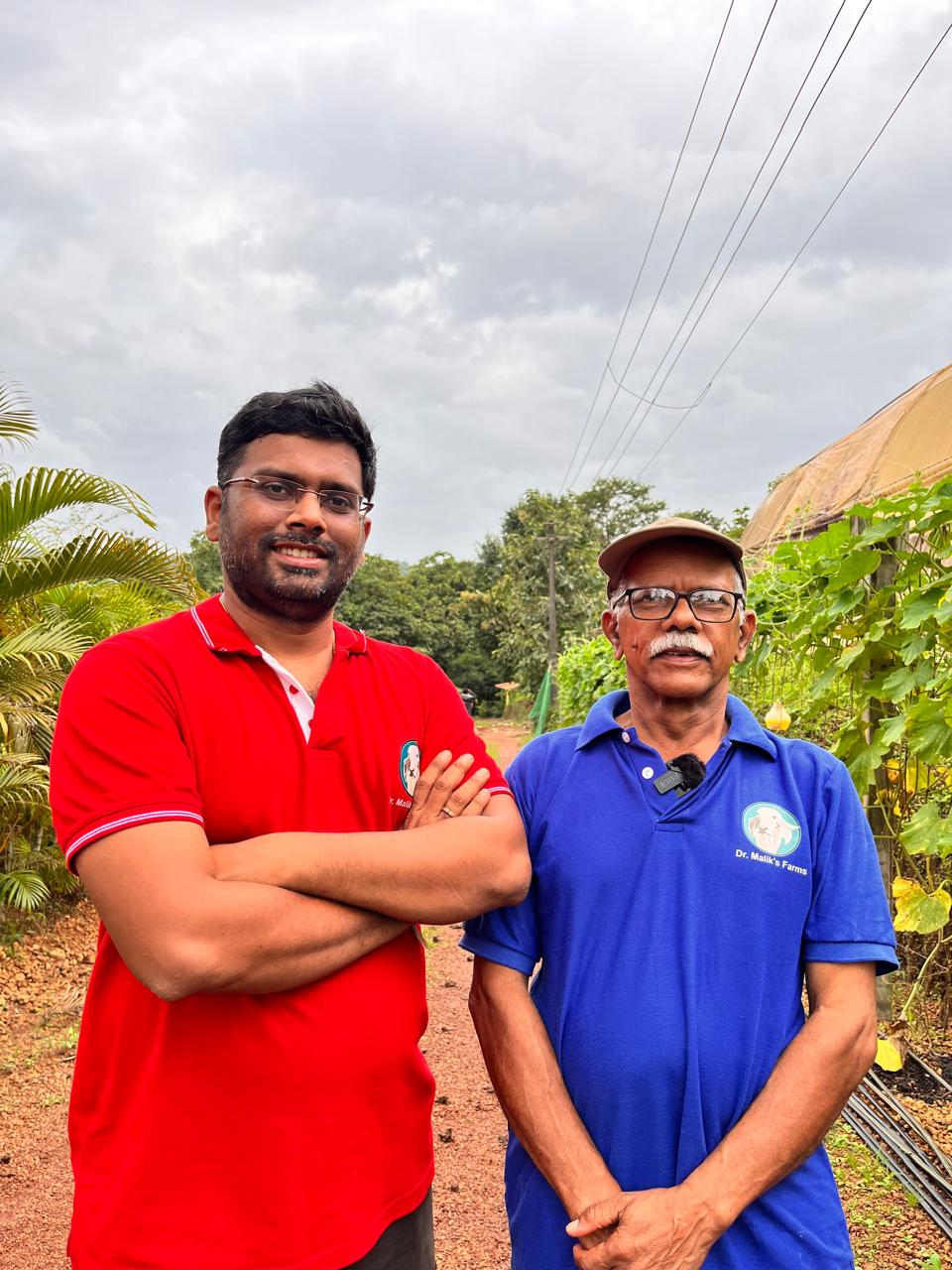
Dr. Bhiwa and his son, Chaitanya Malik, embarked on a special journey to create a successful farm from their empty ancestral land. Dr. Bhiwa, a retired professor, and Chaitanya, a computer engineer, shared a dream of transforming their land into a thriving farm. They named their venture Dr Malik’s Farm, and their story is a shining example of turning a dream into reality through hard work and innovation.
Starting from Scratch: Building a Farm from Barren Land
Dr Malik’s Farm is a prime example of starting a farm from nothing. Unlike farms that pass from one generation to another with established practices, Dr Malik’s Farm began on land that was rocky and covered with seasonal grass. This land had not been used for farming for many years.
In 2014, Dr. Bhiwa and Chaitanya decided to transform this unused land into a thriving farm. They worked hard to clear the land and make it suitable for farming. Their goal was not just to grow crops but to show other villagers that farming could be a successful and fulfilling career.
Dairy Farming: A Focus on Quality
One of the first challenges they faced was finding high-quality manure to keep their farm’s soil healthy. They learned that the best manure comes from Desi cows, also known as Indian cows, rather than the Jersey cows that are more common in Goa. Jersey cows sometimes eat waste and plastic, which affects the quality of their manure.
Dr. Bhiwa and Chaitanya decided to start with three Desi cows, which they brought from Gujarat. These cows produce high-quality dung and gomutra (cow urine), which are essential for organic farming. Over time, their herd grew to 30 cows. The milk from these cows has a unique taste, leading them to create their own brand, Dr Malik’s A2 Milk. They focus on providing fresh, non-pasteurized milk, which they deliver to customers directly, using technology to manage orders and payments.
Expanding into Agro-Tourism
Dr Malik’s Farm is not just about dairy; it also embraces agro-tourism. Agro-tourism is a way of combining farm activities with recreational experiences. Visitors to the farm can enjoy activities while learning about farming. The farm features two natural swimming pools filled with spring water from the land. This water is free from chlorine and chemicals, offering a natural swimming experience.
Educational Visits
Educational tours at Dr Malik’s Farm play a vital role, especially during the peak season from October to February. Schools bring students of varying ages, from preschoolers to university students, to explore the farm’s diverse aspects. These tours are customised to fit the educational level and interests of the students. Topics covered include dairy management, biogas production, lactose intolerance, and veganism. The farm also offers hands-on activities, such as planting and harvesting, to enhance the learning experience. Additionally, the farm engages with schools by providing talks and presentations on farming and sustainability, further enriching students’ understanding of agriculture and environmental practices.
Community Engagement
Dr Malik’s Farm is dedicated to supporting and enriching the local community. They collaborate with local farmers by sharing successful business practices and buying their products, thereby providing a steady market for their goods. This initiative helps local farmers thrive without the need for long-distance travel to markets.
The farm also employs local women to prepare traditional Goan dishes, such as shirvoyo and moogachi kanv, for visitors. These authentic, freshly made dishes offer a taste of local cuisine while supporting community livelihoods.
For special occasions like birthdays and corporate events, the farm involves local artisans and performers. Activities include craft workshops and performances by local groups, showcasing Goan culture and adding a unique touch to the farm experience.
Organic Practices: Staying True to Nature
Dr Malik’s Farm is committed to organic farming principles, ensuring that their practices remain true to nature. They use cow dung and cow urine to enrich the soil and maintain its fertility. Their pest control methods include natural solutions like neem oil and jivamrut—a traditional concoction made from cow dung, cow urine, jaggery, and soil.
The farm also utilises biogas generated from cow dung to provide cooking gas for their staff, while the residual slurry is applied back to the fields. These methods help the farm avoid synthetic chemicals and pesticides, promoting a healthier, more sustainable way of farming.
A Range of Products: More Than Just Milk
Dr Malik’s Farm offers a diverse range of products beyond just A2 milk. Their premium A2 milk is delivered straight to doorsteps in Mapusa, Panjim, Porvorim, Dona Paula, and the Taleigao Kadamba Plateau area. In addition, they produce A2 ghee using traditional methods: first making curd, then churning it to create white butter (loni), and finally melting it to produce ghee—the purest form of clarified butter.
The farm also offers natural dhoop sticks, a fragrant incense made from traditional ingredients, and Uptan, a time-honoured body scrub. Visitors can also purchase fresh vegetables from the farm during their Sunday trips, enjoying a day out and supporting local agriculture.
Future Plans: Growing and Expanding
Dr Malik’s Farm is evolving with exciting future plans. They aim to develop their ecotourism aspect into a centre for learning, where visitors can explore farming techniques and nature activities. This initiative will cater to those interested in understanding and experiencing sustainable farming practices firsthand.
In addition, the farm plans to open a farm-to-table restaurant, where guests can enjoy meals made from ingredients cultivated right on the farm. This restaurant will offer a unique culinary experience, featuring dishes like pizzas and salads prepared with fresh, farm-grown produce.
Currently, Dr Malik’s Farm provides a Goman buffet lunch featuring 15 items, with most ingredients sourced directly from the farm. As they continue to grow, they plan to expand their menu to include even more diverse and delightful dishes.
Social Media and Community Impact
The farm has effectively used social media to share their story. They have built a strong presence online, helping people learn about their farm and its products. Their social media accounts keep followers updated on farm activities and new developments.
Advice for Aspiring Farmers
Chaitanya offers crucial advice for those venturing into farming. Success in agriculture extends beyond understanding crops and cultivation. Mastering additional skills is essential. Effective communication, public relations, marketing, and sales are vital for promoting and growing your farm. Additionally, applying engineering techniques can significantly enhance your farming practices.
For educated individuals entering the field, leveraging your academic background and continuously learning new skills can transform farming into a profitable and impactful venture. Embrace the full spectrum of skills needed to thrive and innovate in the farming industry.
Conclusion
Dr Malik’s Farm is a great example of how passion and hard work can turn a dream into a successful reality. Chaitanya has transformed barren land into a thriving, sustainable farm. Their dedication to organic farming, community involvement, and innovative practices sets a high standard for others to follow. As they continue to grow and expand, Dr Malik’s Farm remains a model of what can be achieved with vision and perseverance.


